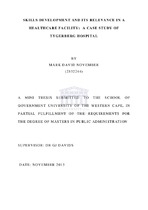Skills development and its relevance in a healthcare facility: a case study of Tygerberg Hospital
Abstract
The public health sector over the years had been under constant criticism for the lack of or substandard service delivery. The post1994 democratic era was accompanied by slogans such as ‘a better life for all ’. These slogans in part stem from the Constitution of the Republic of South Africa, 1996. The Constitution, chapter two, in its discussion on the Bill of Rights states that everyone has the right to quality health care services. The critics argue that the fundamental r right enshrined with in the Constitution in as far as it pertains to healthcare has been violated. The state introduced various interventions, such as human resource capacity development t programs, to turn the dismal state of public health care around. This research focused on the impact and the relevance of the human resource development within the public health sector. The following research question had been formulated to guide the research; is skills development within the state undertaken for compliance sake or is it a focused interventionist approach aimed at improving the skills set of staff to perform effectively and efficiently? The research was qualitative in nature and the case methodology was used. In this regard Tygerberg hospital was used as the case study. A number of findings emanated from the data collection process, amongst other, that the skills development is not workplace specific but rather undertaken for compliance sake. Furthermore, that no individual staff development plans exist. The end result is that the skills development intervention aimed at improving the staff capacity and the state of health service generally is not making any meaningful impact. The major recommendation is that a health audit must be done, which must inform the development of the hospital staff skills development plan. This in turn must be used to develop individual staff f development plans. This alignment of development plans from provincial level to hospitals and then to the individual will result in a more focussed skills intervention and ultimately an improved public health sector.

